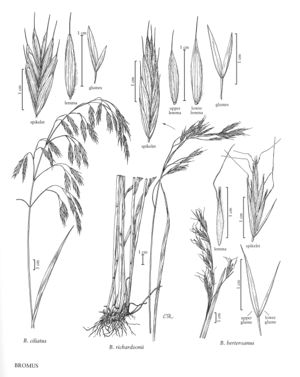Difference between revisions of "Bromus richardsonii"
FNA>Volume Importer |
imported>Volume Importer |
||
| (8 intermediate revisions by 2 users not shown) | |||
| Line 7: | Line 7: | ||
|synonyms={{Treatment/ID/Synonym | |synonyms={{Treatment/ID/Synonym | ||
|name=Bromposis richardsonii | |name=Bromposis richardsonii | ||
| − | |authority= | + | |authority= |
| − | }}{{Treatment/ID/Synonym | + | |rank=species |
| + | }} {{Treatment/ID/Synonym | ||
|name=Bromopsis canadensis subsp. ricbardsonii | |name=Bromopsis canadensis subsp. ricbardsonii | ||
| − | |authority= | + | |authority= |
| + | |rank=subspecies | ||
}} | }} | ||
|hierarchy=Poaceae;Poaceae subfam. Pooideae;Poaceae tribe Bromeae;Bromus;Bromus sect. Bromopsis;Bromus richardsonii | |hierarchy=Poaceae;Poaceae subfam. Pooideae;Poaceae tribe Bromeae;Bromus;Bromus sect. Bromopsis;Bromus richardsonii | ||
| Line 22: | Line 24: | ||
-->{{Treatment/Body | -->{{Treatment/Body | ||
| − | |discussion=<p>Bromus richardsonii grows in meadows and open woods in the upper montane and subalpine zones, at 2000-4000 m in the southern Rocky Mountains, and at lower elevations northwards. Its range extends from southern Alaska to southern California and northern Baja California, Mexico; it is found as far east as Saskatchewan, South Dakota, and western Texas. Specimens with pubescent nodes and glumes are apparently confined to the southwestern United States.</p> | + | |discussion=<p><i>Bromus richardsonii</i> grows in meadows and open woods in the upper montane and subalpine zones, at 2000-4000 m in the southern Rocky Mountains, and at lower elevations northwards. Its range extends from southern Alaska to southern California and northern Baja California, Mexico; it is found as far east as Saskatchewan, South Dakota, and western Texas. Specimens with pubescent nodes and glumes are apparently confined to the southwestern United States.</p> |
|tables= | |tables= | ||
|references= | |references= | ||
| Line 31: | Line 33: | ||
-->{{#Taxon: | -->{{#Taxon: | ||
name=Bromus richardsonii | name=Bromus richardsonii | ||
| − | |||
|authority=Link | |authority=Link | ||
|rank=species | |rank=species | ||
| Line 38: | Line 39: | ||
|basionyms= | |basionyms= | ||
|family=Poaceae | |family=Poaceae | ||
| + | |illustrator=Cindy Roché | ||
| + | |illustration copyright=Utah State University | ||
|reference=None | |reference=None | ||
|publication title= | |publication title= | ||
|publication year= | |publication year= | ||
|special status= | |special status= | ||
| − | |source xml=https:// | + | |source xml=https://bitbucket.org/aafc-mbb/fna-data-curation/src/200273ad09963decb8fc72550212de541d86569d/coarse_grained_fna_xml/V24/V24_312.xml |
|subfamily=Poaceae subfam. Pooideae | |subfamily=Poaceae subfam. Pooideae | ||
|tribe=Poaceae tribe Bromeae | |tribe=Poaceae tribe Bromeae | ||
Latest revision as of 16:22, 11 May 2021
Plants perennial; not rhizomatous. Culms 50-110(145) cm, erect to spreading; nodes (3)4-5(6), usually glabrous, sometimes pubescent; internodes usually glabrous. Basal sheaths often retrorsely pilose; culm sheaths glabrous, often tufted-pilose near the auricle position, midrib of the culm leaves not abruptly narrowed just below the collar; auricles absent; ligules 0.4-2 mm, glabrous, rounded, erose, ciliolate; blades 10-35 cm long, 3-12 mm wide, flat, glabrous. Panicles 10-20(25) cm, open, nodding; branches ascending to spreading or drooping, filiform. Spikelets 15-25(40) mm, elliptic to lanceolate, terete to moderately laterally compressed, with (4)6-10(15) florets. Glumes usually glabrous, sometimes pubescent; lower glumes 7.5-12.5 mm, 1(3)-veined; upper glumes 8.9-11.3 mm, 3-veined, often mucronate; lemmas 9-14(16) mm, elliptic, rounded over the midvein, margins more or less densely pilose on the lower 1/2 or 3/4, lower lemmas in a spikelet glabrous across the backs, uppermost lemmas with appressed hairs on the backs, apices obtuse, entire; awns (2)3-5 mm, straight, arising less than 1.5 mm below the lemma apices; anthers 1.6-2.7 mm. 2n = 28.
Discussion
Bromus richardsonii grows in meadows and open woods in the upper montane and subalpine zones, at 2000-4000 m in the southern Rocky Mountains, and at lower elevations northwards. Its range extends from southern Alaska to southern California and northern Baja California, Mexico; it is found as far east as Saskatchewan, South Dakota, and western Texas. Specimens with pubescent nodes and glumes are apparently confined to the southwestern United States.
Selected References
None.
